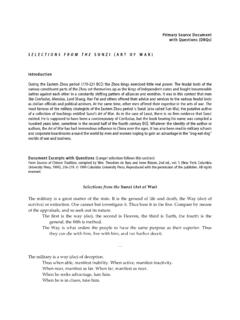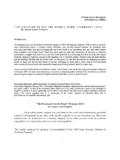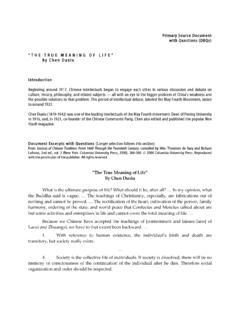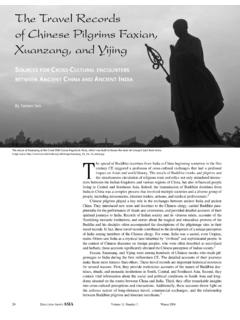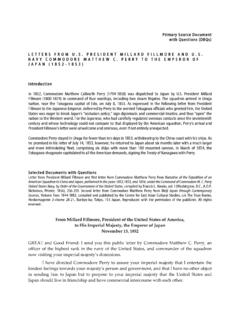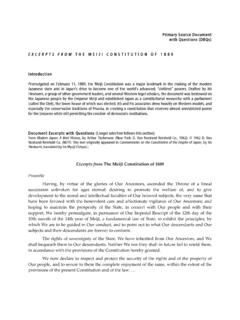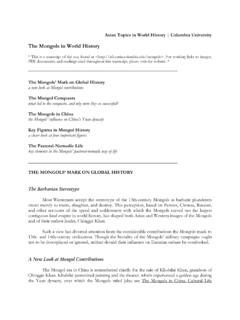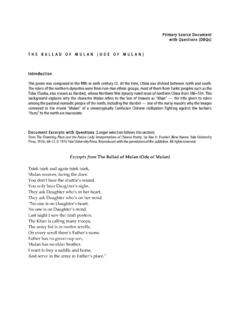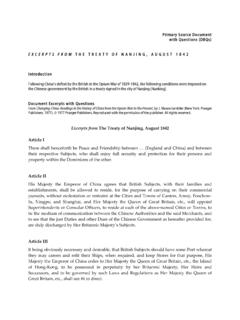Transcription of Math Exercise on the Abacus - Columbia University
1 math Exercise on the Abacus ( Suanpan in Chinese) Teachers Introduction Student Materials Introduction Cards 1-7 Practicing Basics Cards 8-11 Exercises Cards 12, 14, 16 Answer keys Cards 13, 15, 17 Learning: Card 18 Up, Down, Rid, Advance Exercises: Addition (the numbers 1-9) Cards 18-28 Advanced Addition Cards 29-30 Exercises: Subtraction Cards 31-39 (the numbers 1-9) Acknowledgment: This unit is adapted from A Children s Palace, by Michele Shoresman and Roberta Gumport, with illustrations by Elizabeth Chang ( University of Illinois Urbana-Champagne, Center for Asian Studies, Outreach Office, 3rd ed.)
2 , 1986. Print edition, now out of print.) 1 Teachers Introduction: Level: This unit is designed for students who understand p1ace value and know the basic addition and subtraction facts. Goals: 1. The students will learn to manipulate one form of ca1cu1ator used in many Asian countries. 2. The concept of p1ace value will be reinforced. 3. The students will learn another method of adding and subtracting. Instructions The following student sheets may be copied so that your students have individual sets. Individual suanpan for your students can be ordered from China Sprout: Product # A948 or ATG022 Evaluation The students will be able to manipulate a suanpan to set numbers, and to do simple addition and subtraction problems.
3 Vocabulary suanpan set beam rod c1ear ones rod tens rod hundreds rod 2 Card 1 Suanpan Abacus The Abacus is an ancient calculator still used in China and other Asian countries. In Chinese it is called a Suanpan. It is a frame divided into an upper and lower section by a bar called the beam. The Abacus can be used for addition, subtraction, multiplication, and division. 3 Card 2 Clearing the suanpan: Before you begin work on the Suanpan you must clear it. This is done by moving all of the beads in the upper section to the top of the frame and all of the beads in the lower section to the bottom of the frame. Clear your Suanpan. It should look like this: 4 Card 3 Using your fingers to move the beads: Put your Suanpan on your desk.
4 Hold it with your left hand. Use your thumb to move the beads in the lower section up. Use your index finger to move the beads in the lower section down. Use your middle finger to move the upper section beads up and down. 5 Card 4 The Suanpan has thirteen rods. The exercises we will do will use the first three rods the ones rod, the tens rod, and the hundreds rod. 6 Card 5 There are two beads on the upper section of each rod and five beads on the lower section of each rod. Each bead in the upper section has a value of 5. Each bead in the lower section has a value of 1. *To set a number less than 10, you only need to count and move beads on the ones rod.
5 7 Card 6 When reading the Suanpan, you count only the beads that have been moved to the beam in the middle. Here are some numbers and how they would look on the Suanpan: 8 Card 7 To set the number 5: ( Set means to move the beads to the position that shows the number indicated) move the bead in the upper section of the ones rod down to the beam. (The fifth bottom bead is not used in addition.) As soon as five bottom beads are needed, clear the bottom section and bring down on bead from the top. 9 Card 8 Practicing Basics Set the numbers 6, 7, 8, and 9. Check your answers with the drawings on Card #9. 10 Card 9 Answer Sheet for Exercises on Card #8: 11 Card 10 To set the number 10 on the Suanpan: clear the beads on the ones rod and move one bead on the lower section of the tens rod up to the beam.
6 As soon as you have 5 beads up in the bottom section and one bead down in the top section, clear that row and push up one in the bottom section of the next column. Your Suanpan should look like this: 12 Card 11 This is how the number 11 would look: With a number of 10 or more, begin with the column you will need that is furthest to the left. o To make 11, first move up one bead on the lower section of the tens rod, o then move up one bead on the lower section of the ones rod. 13 Card 12 Exercises Set 12, 13, 14, and 15 on your Suanpan. Check your answers on Card #13. 14 Card 13 Answer Sheet for Exercises on Card #12: 15 Card 14 Practice setting, 16, 20, 25, 34, and 48 on your Suanpan.
7 Check you answer with the drawings on Card #15. 16 Card 15 Answer Sheet for Exercises on Card #14: 17 Card 16 Practice setting 56, 69, 71, 85, 92 and 105. Check your answers with the drawings on Card #17. 18 Card 17 Answer Sheet for Exercises on Card #16: 19 Card 18 Learning UP, DOWN, RID, and ADVANCE Memorize these movements so you can use the Suanpan quickly: Up: move one bead at the lower section up (use your thumb) Down: move one bead on the upper section down (use your middle finger) Rid: move one bead on the lower section down (use your index finger) or move one bead of the upper section up (use your middle finger) Advance: move one bead up in the next rod to the left (use your thumb) ** In addition: the top-most bead and the bottom-most bead are not used.
8 20 Card 19 EXERCISES: Addition Practice adding 1 : 21 Card 20 Practice adding 2 : 22 Card 21 Practice adding 3 : 23 Card 22 Practice adding 4 : 24 Card 23 Practice adding 5 : S 25 Card 24 Practice adding 6 : 26 Card 25 Practice adding 7 : 27 Card 26 Practice adding 8 : 28 Card 27 Practice adding 9 : 29 Card 28 EXERCISES: Advanced Addition 1. 64+72= First set the number 64 on the Suanpan. Draw what your Suanpan looks like: Next from left to right add seven tens to six tens o Use the formula up 2 rid 5, advance 1. Now in the ones column and 2 to 4 o Use formula down 5, rid 3. Draw you answer: 30 Card 29 2.
9 59+43= Set 59 on your Suanpan. Draw what your Suanpan looks like: Starting in the left-most column add 4 tens to 5 tens. Write the formula that you used: Now in the ones column add 3 to 9. Write the formula that you used: Draw your answer: 31 Card 30 3. 75+38= Set 75 on your Suanpan. Draw what your Suanpan looks like: Starting left add 3 tens to 7 tens. Write the formula that you used: Now add 8 to 5. Write the formula that you used: Draw your answer: 32 Card 31 EXERCISES: Subtraction To subtract using the Suanpan you must memorize these formulas. The movements (rid, down, up) are the same as in addition. Practice subtracting 1 : 33 Card 32 Practice subtracting 2 : 34 Card 33 Practice subtracting 3 : 35 Card 34 Practice subtracting 4 : 36 Card 35 Practice subtracting 5 : 37 Card 36 Practice subtracting 6 : 38 Card 37 Practice subtracting 7 : 39 Card 38 Practice subtracting 8 : 40 Card 39 Practice subtracting 9 : 41
